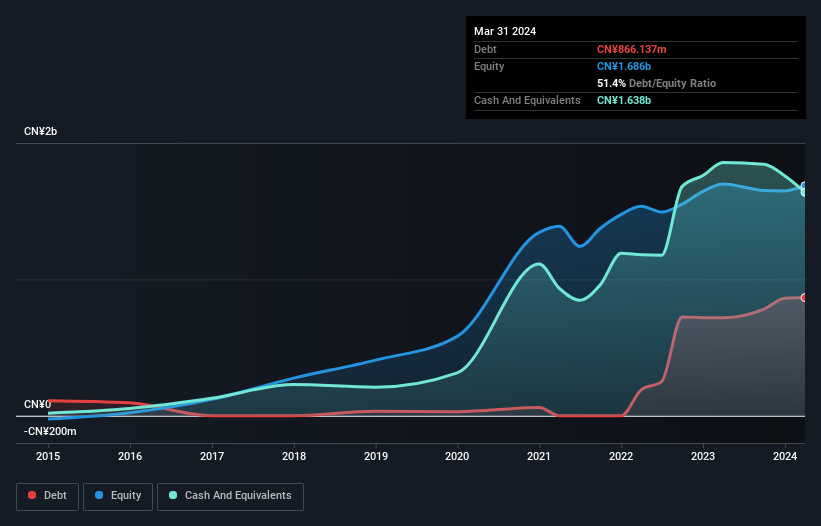
Some say volatility, rather than debt, is the best way to think about risk as an investor, but Warren Buffett famously said that 'Volatility is far from synonymous with risk.' It's only natural to consider a company's balance sheet when you examine how risky it is, since debt is often involved when a business collapses. As with many other companies Marssenger Kitchenware Co., Ltd. (SZSE:300894) makes use of debt. But the more important question is: how much risk is that debt creating?
When Is Debt A Problem?
Generally speaking, debt only becomes a real problem when a company can't easily pay it off, either by raising capital or with its own cash flow. If things get really bad, the lenders can take control of the business. However, a more frequent (but still costly) occurrence is where a company must issue shares at bargain-basement prices, permanently diluting shareholders, just to shore up its balance sheet. Of course, the upside of debt is that it often represents cheap capital, especially when it replaces dilution in a company with the ability to reinvest at high rates of return. When we think about a company's use of debt, we first look at cash and debt together.
View our latest analysis for Marssenger Kitchenware
What Is Marssenger Kitchenware's Net Debt?
The image below, which you can click on for greater detail, shows that at March 2024 Marssenger Kitchenware had debt of CN¥866.1m, up from CN¥781.2m in one year. However, its balance sheet shows it holds CN¥1.64b in cash, so it actually has CN¥772.3m net cash.

How Strong Is Marssenger Kitchenware's Balance Sheet?
Zooming in on the latest balance sheet data, we can see that Marssenger Kitchenware had liabilities of CN¥951.6m due within 12 months and liabilities of CN¥555.6m due beyond that. Offsetting these obligations, it had cash of CN¥1.64b as well as receivables valued at CN¥139.0m due within 12 months. So it actually has CN¥270.2m more liquid assets than total liabilities.
This surplus suggests that Marssenger Kitchenware has a conservative balance sheet, and could probably eliminate its debt without much difficulty. Succinctly put, Marssenger Kitchenware boasts net cash, so it's fair to say it does not have a heavy debt load!
The modesty of its debt load may become crucial for Marssenger Kitchenware if management cannot prevent a repeat of the 46% cut to EBIT over the last year. When it comes to paying off debt, falling earnings are no more useful than sugary sodas are for your health. When analysing debt levels, the balance sheet is the obvious place to start. But ultimately the future profitability of the business will decide if Marssenger Kitchenware can strengthen its balance sheet over time. So if you're focused on the future you can check out this free report showing analyst profit forecasts.
Finally, a company can only pay off debt with cold hard cash, not accounting profits. Marssenger Kitchenware may have net cash on the balance sheet, but it is still interesting to look at how well the business converts its earnings before interest and tax (EBIT) to free cash flow, because that will influence both its need for, and its capacity to manage debt. During the last three years, Marssenger Kitchenware produced sturdy free cash flow equating to 64% of its EBIT, about what we'd expect. This free cash flow puts the company in a good position to pay down debt, when appropriate.
Summing Up
While it is always sensible to investigate a company's debt, in this case Marssenger Kitchenware has CN¥772.3m in net cash and a decent-looking balance sheet. So we are not troubled with Marssenger Kitchenware's debt use. The balance sheet is clearly the area to focus on when you are analysing debt. However, not all investment risk resides within the balance sheet - far from it. Case in point: We've spotted 4 warning signs for Marssenger Kitchenware you should be aware of, and 2 of them are a bit unpleasant.
If you're interested in investing in businesses that can grow profits without the burden of debt, then check out this free list of growing businesses that have net cash on the balance sheet.
New: Manage All Your Stock Portfolios in One Place
We've created the ultimate portfolio companion for stock investors, and it's free.
• Connect an unlimited number of Portfolios and see your total in one currency
• Be alerted to new Warning Signs or Risks via email or mobile
• Track the Fair Value of your stocks
Have feedback on this article? Concerned about the content? Get in touch with us directly. Alternatively, email editorial-team (at) simplywallst.com.
This article by Simply Wall St is general in nature. We provide commentary based on historical data and analyst forecasts only using an unbiased methodology and our articles are not intended to be financial advice. It does not constitute a recommendation to buy or sell any stock, and does not take account of your objectives, or your financial situation. We aim to bring you long-term focused analysis driven by fundamental data. Note that our analysis may not factor in the latest price-sensitive company announcements or qualitative material. Simply Wall St has no position in any stocks mentioned.
About SZSE:300894
Marssenger Kitchenware
Engages in the research and development, design, production, and sale of kitchen appliances and other household electrical appliances in China.
Moderate growth potential with mediocre balance sheet.
Market Insights
Community Narratives




